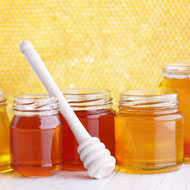
Study suggests honey is still being contaminated after EU ban
One in five samples of UK honey still contain residues of neonicotinoids, despite an EU ban on their use in seed dressings on flowering crops. This is according to new research by the Centre for Ecology & Hydrology.
Whilst the low-level residues pose no threat to human health, previous research suggests they could have a negative impact on honey bee populations.
Around half of the honey samples taken prior to the introduction of the ban were found to contain neonicotinoids.
Lead author Dr Ben Woodcock commented: “While the frequency of neonicotinoid contaminated samples fell once the EU-ban was in place, our data suggest that these pesticides remain prevalent in the farming environment.”
The research team analysed 130 honey samples provided by British bee keepers during 2014 and 2015.
According to results published in PLOS ONE, honey samples collected earlier on in the year - when oilseed rape is in flower - were more likely to contain the pesticides than samples taken in late summer. There was also a positive association between neonicotinoid concentrations in honey and the amount of oilseed rape grown near the hive.
A possible explanation, according to scientists, is that crops that are attractive to bees are being grown in soils contaminated with neonicotinoid residues from previous crops. This could shed light on why neonicotinoid residues are being found in honey after the ban.
Farmers in the UK continue to treat a large amount of cereal with neonicotinoid seed dressings, as this is exempt from the EU ban. However, researchers are warning that if this practice is causing soil contamination that lasts from one year to the next, it could pose a risk to bees feeding on flowering crops in the same fields the following year.
Dr Woodcock said: “We don’t know what the risk of such long-term chronic exposure to neonicotinoids is over the course of an entire flowering season. Such long term but low levels of exposure could have potentially sub-lethal effects impacts on honeybees.
“Questions still remain as to the actual mechanism of contamination of honey with neonicotinoid residues despite the ban and understanding this should be an area of urgent research activity.”



 The Veterinary Medicines Directorate (VMD) is inviting applications from veterinary students to attend a one-week extramural studies (EMS) placement in July 2026.
The Veterinary Medicines Directorate (VMD) is inviting applications from veterinary students to attend a one-week extramural studies (EMS) placement in July 2026.